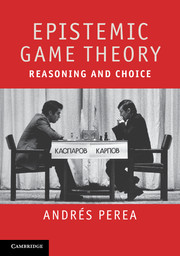Book contents
- Frontmatter
- Contents
- List of figures
- List of tables
- Acknowledgments
- 1 Introduction
- Part I Standard beliefs in static games
- 2 Belief in the opponents' rationality
- 3 Common belief in rationality
- 4 Simple belief hierarchies
- Part II Lexicographic beliefs in static games
- Part III Conditional beliefs in dynamic games
- Bibliography
- Index
2 - Belief in the opponents' rationality
Published online by Cambridge University Press: 05 July 2012
- Frontmatter
- Contents
- List of figures
- List of tables
- Acknowledgments
- 1 Introduction
- Part I Standard beliefs in static games
- 2 Belief in the opponents' rationality
- 3 Common belief in rationality
- 4 Simple belief hierarchies
- Part II Lexicographic beliefs in static games
- Part III Conditional beliefs in dynamic games
- Bibliography
- Index
Summary
Beliefs about the opponent's choice
In everyday life we must often reach decisions while knowing that the outcome will not only depend on our own choice, but also on the choices of others. If you meet with a couple of friends, for instance, whether your friends have to wait or not depends on the time you arrive yourself, but also on the time your friends arrive. If you prepare for an exam, then the grade you will obtain depends on your effort, but also on the specific questions chosen by the teacher. When playing a chess match with your friend, the winner is obviously determined not only by your own strategy, but also by the strategy of your friend.
Each of these situations is called a game, and the people involved are called players. These terms are perhaps a bit misleading, since “games” and “players” usually refer to recreational games, sports or other competitions with winners and losers. However, the term “game” as we will use it in this book is much broader – it may be used for any situation in which two or more individuals make choices, and the final outcome depends not only on the choice of one individual, but on the choices of all. Also, the outcome of a game may be any situation, not just a win, a draw, or a loss. In fact, in the first two games described above there are no winners or losers, and the situations at hand do not correspond to any form of competition.
- Type
- Chapter
- Information
- Epistemic Game TheoryReasoning and Choice, pp. 13 - 67Publisher: Cambridge University PressPrint publication year: 2012



